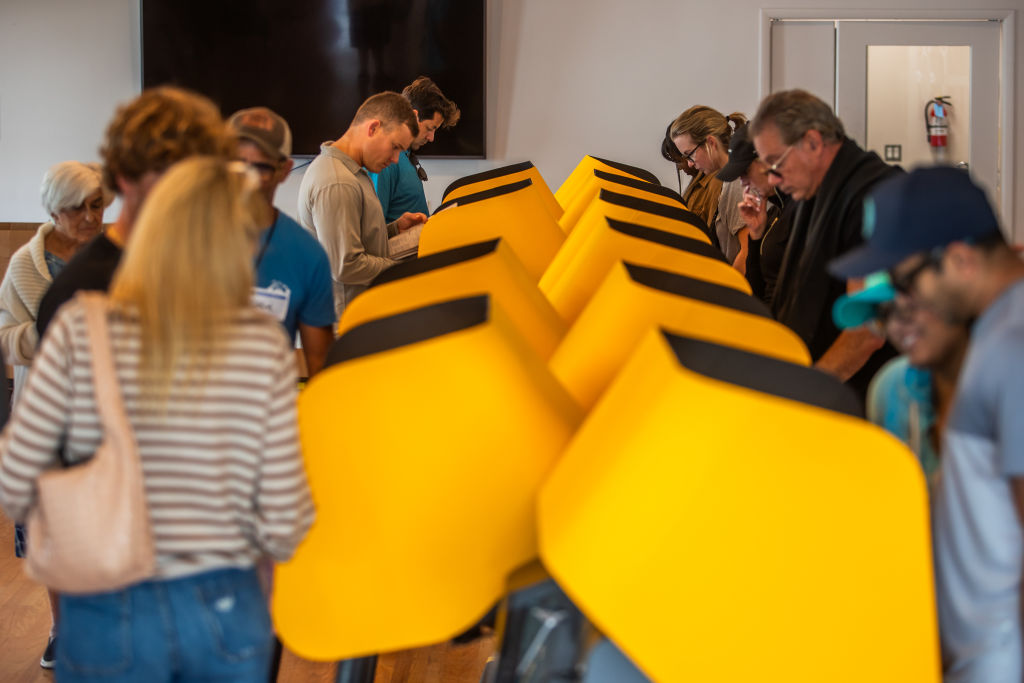The high drama of Germany’s Traffic Light Coalition is over. Alas for fans of political telenova, Chancellor Scholz’s three-year experiment in party polyamory ended in anger and the eviction of the awkward partner, the Free Democrats (FDP). This less-than-grand coalition was built atop a grand fudge: the FDP could defend the debt brake on formal budget deficits while the Social Democratic Party (SPD) and Greens would tap off-budget Covid funds for their spending plans. Once the constitutional court required the recognition of this spending on the formal budget, conflict over the resulting shortfall was inevitable. The FDP demanded budget cuts, the Greens defended climate subsidies, and the SPD refused to contemplate reductions or reforms to worker benefits. When the FDP leader Christian Lindner provoked his partners with a set of demands he knew they could not accept, Scholz had little choice but to boot him from the government.
Where does this leave Scholz? He has now committed to a vote of no confidence followed by the least snappy of snap elections next February. His attempt to cajole Christian Democratic Union (CDU) leader Friedrich Merz into supporting his remaining legislative priorities failed. Merz scented blood and wanted new elections amid the lingering miasma of the least popular government in Bundesrepublik history. While the best thing the chancellor could do for the SPD is to step aside for Boris Pistorius, his much more popular defence minister, Scholz shows every intention of leading his party into the election.
Even facing the beleaguered Scholz, Merz faces an uphill battle if he is to avoid another grand coalition with the SPD. The conservatives are polling well short of a majority and current surveys show no combination with smaller parties would put them over 50 per cent. The FDP is his most suitable partner but it may fall short of the 5 per cent hurdle to enter the Bundestag. An alliance with former Socialist Unity Party (SED) member Sahra Wagenknecht would require political contortions likely to provoke an explosion among the CDU’s conservative supporters. The Greens with their 11-12 per cent might get him closer to a majority, but would insist on their economy-wrecking eco-orthodoxy as the price for their support.
Overshadowing these calculations is the Alternative for Germany (AfD), which now leads the SPD with the support of at least 15 per cent of likely voters. While the numbers alone suggest a clear CDU-AfD majority, Merz strongly rejects any coalition with the populist Right. In a clear bid to pull some votes from the AfD, he came out swinging this week in the Bundestag, coupling ridicule of the AfD with a call to control immigration and roll back climate protections. If Merz can convince half of AfD voters that only the CDU can actually implement the policies they support, he may increase his support enough to take on a crippled SPD as an emphatically junior coalition partner.
Where does all this leave Germany? With the world apparently erupting around it, the country is in political stasis with a weak minority government unable to implement any reforms or new policies. The longer term may not offer much improvement. The February election will be followed by coalition negotiations which will dilute any ambitious policies capable of shocking the German economic model out of its current torpor. And a shock is needed: German prosperity derives from demand for German exports, demand that is now in secular decline. China is attempting to revive its own economy by firing up its export machine with products that are now qualitatively competitive with expensive German brands. The next Trump administration has the German car industry in its sights with demands to equalize tariffs imposed on US and German car imports. Raising US tariffs on European car imports from the current 2.5 per cent to the 10 per cent already imposed on US cars exported to Europe will savage demand for German-made cars. Coalition partners will squabble over budget priorities after the February vote, but will fail to address the fundamental problem facing the country: Germany’s dependence on exports is no longer supported by world demand for them. Even with political will and a strong mandate, Friedrich Merz will find it difficult to break the ingrained habits of Germany Inc. and create a modern service-oriented economy.
Where does this leave the EU? Its strongest economy is in a deep funk, with months before any chance of reform or revival. Germany can’t close its own budget gap, much less provide its usual monetary contributions to smooth over various disputes in Brussels. The minority government in France is grappling with excessive deficits and is in no position to take the lead on anything beyond a purely hortatory role. Every call for “more Europe” such as Mario Draghi’s reform agenda requires additional funding that no member state is willing to provide. Defence autonomy, continued support for Ukraine, and ambitious industrial policy all require cash beyond the resources available in the EU budget. German money has floated the boat since the Coal and Steel Community founded in 1952, but if Germany can’t sell cars abroad, it cannot pay for the EU.
Unfortunately, the EU believes that these hard-edged problems can be solved with a decisive communiqué. At last week’s summit, the EU announced its goal of “ensuring our industrial renewal and decarbonisation, and allowing the EU to remain an industrial and technological powerhouse.” Behold the stupendous power of the word “and” which can magically resolve tensions between industrial renewal, decarbonization and the current needs of a powerhouse economy. Happy words from Brussels cannot obscure a sobering fact. The EU faces a reckoning in a world hardening into regional economic blocs ready to choke the flood of German export earnings that has bankrolled the European project since its inception.





Economic liberal Lindner provokes coalition partners with free market talk